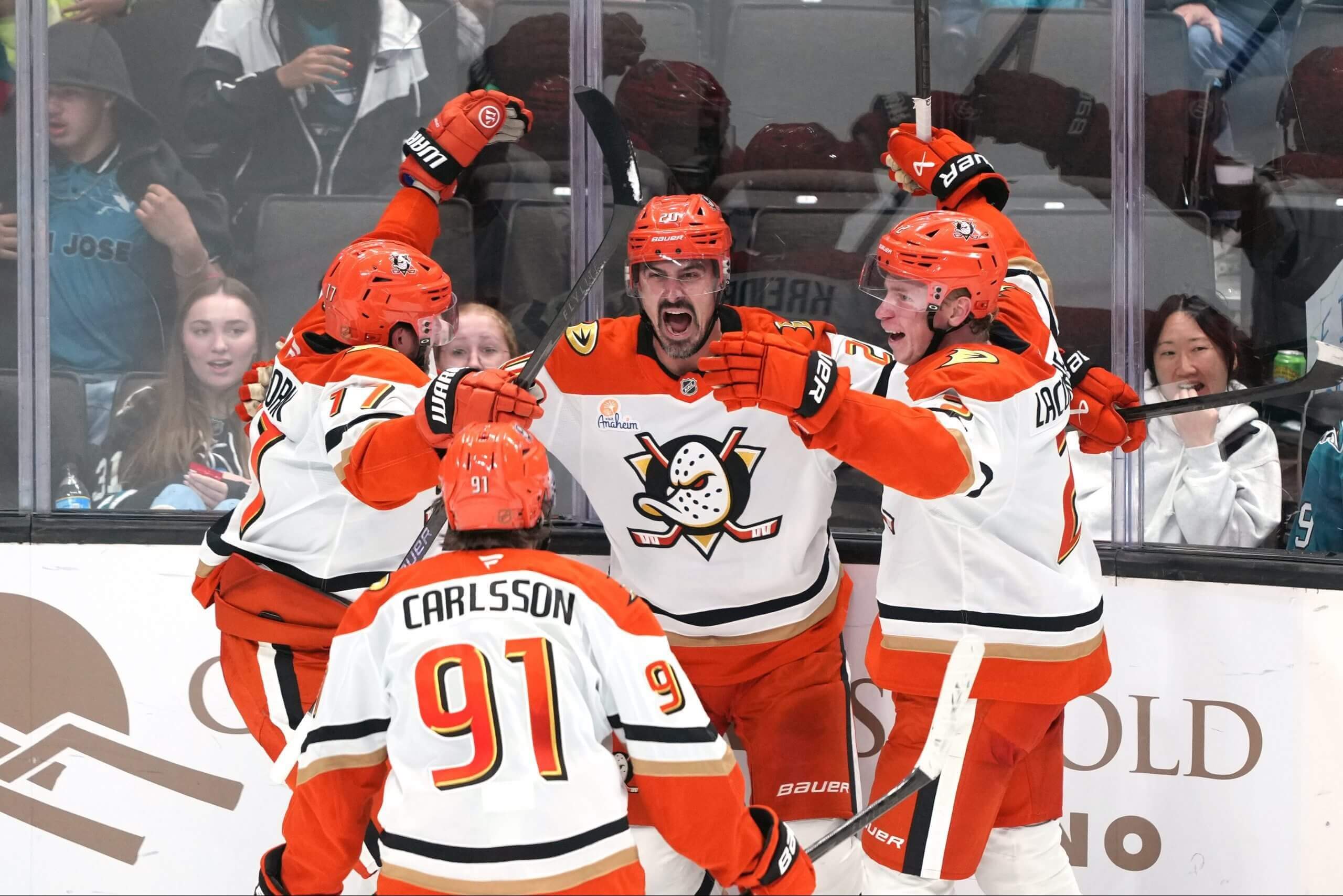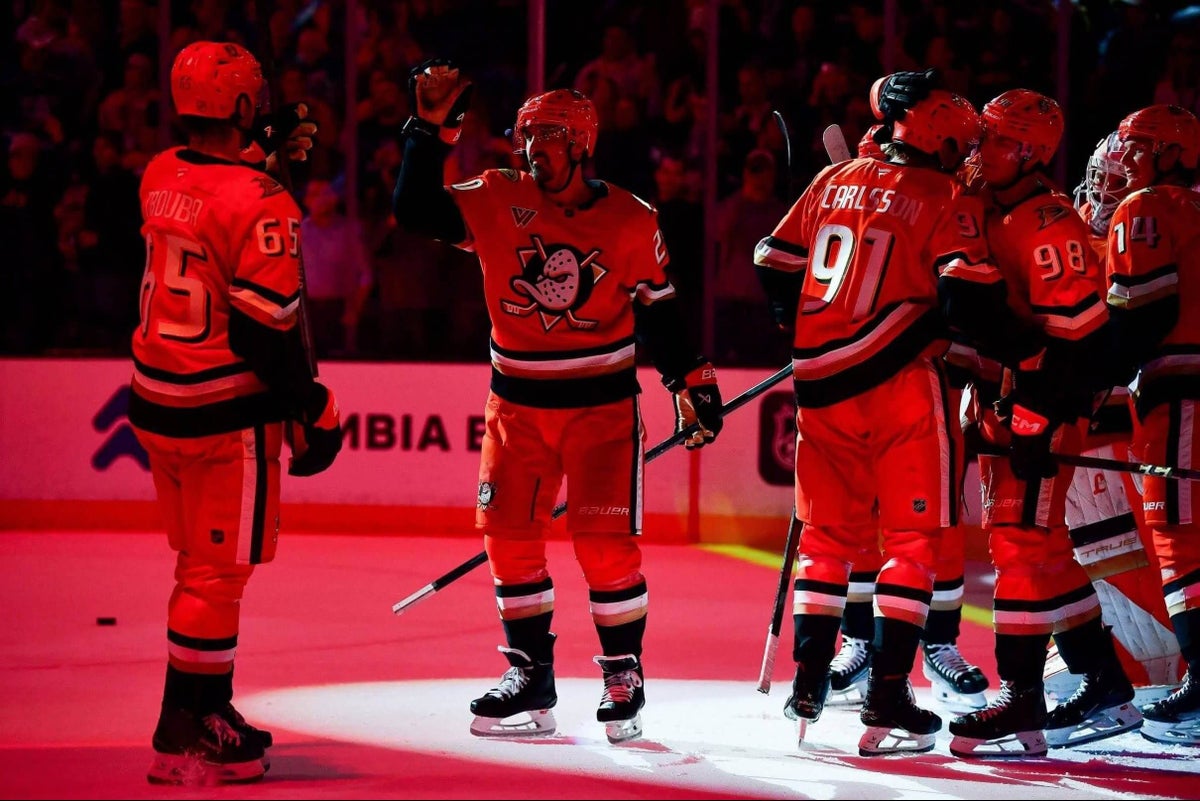ANAHEIM, Calif. — Trying to get Chris Kreider to talk about himself can be as challenging as getting his 6-foot-3, 232-pound body away from your team’s net.
The latest example of the latter came Tuesday night. The challenge enhances when you have one fewer player on your side and Kreider is hovering around the crease. Constantly. Matt Dumba, working on the Pittsburgh Penguins’ penalty kill, found out when dealing with the new Anaheim Ducks left wing on a power play.
Kreider shifted to his left and then back to his right as he worked behind Dumba in the Penguins’ diamond-shaped setup. And then the winger turned his body toward the net while standing outside the crease to the immediate right of Pittsburgh goalie Tristan Jarry. Kreider presented his stick on the ice and kept it there, giving Anaheim’s Leo Carlsson a target to hit and punching that perfect pass behind Jarry. Dumba tried to get his skate in the way of the feed, but he had little chance against that or Kreider behind him.
With that, Kreider pumped his arms and let out his familiar goateed yell. But he wasn’t done. Handed another power play with just 1:34 left in regulation, the 34-year-old floated into the bumper spot within the Penguins’ diamond. A short pass from Troy Terry, a snap of his wrist, a blur of a shot past Jarry’s left shoulder and Kreider was pumping his right fist with an even louder yell as a record Honda Center crowd erupted.
Kreider has done it 330 times in his 14-year career, and in his first few games with the Ducks, he is showing the NHL — and maybe the New York Rangers club he once hoped never to leave — that he is far from done. It has been only three games with Anaheim since a June 12 trade, but back-to-back two-goal efforts quickly endear one to a new fan base.
“Of course,” he said after the 4-3 comeback win he triggered. “Yeah. Yes.”

In trading for Chris Kreider, the Ducks addressed something they’ve lacked in a seven-year postseason drought: a power-play presence. (Darren Yamashita / Imagn Images)
There is delicious irony in a week’s worth of play with Kreider already scoring four times — including a tying finish Saturday, late in regulation, at the San Jose Sharks to go with his first Ducks winner — and the Rangers becoming the first team in NHL history to get shut out in their first three home games. After 13 years and enough deliveries in big moments on Broadway to become beloved by a demanding Blueshirts faithful, Kreider has embraced this massive change in his career.
“Life is change,” Kreider told The Athletic during his first Anaheim training camp. “It’s all part of it. Just some are bigger than others. It’s a pretty big change, but adjusting and enjoying every second.”
As evidence of that inclination to tackle a new challenge, Kreider waived his no-trade clause for the deal to the Ducks that sent forward prospect Carey Terrance to the Rangers while the teams swapped mid-round picks in this year’s NHL Draft. The view of it was a way for the Rangers to clear some salary-cap space, much like they did with the Ducks last winter when Anaheim took on Jacob Trouba’s full salary. But Kreider had also accepted that Rangers general manager Chris Drury had been out to move the club’s longest-tenured player.
Moving to a situation where you are wanted instead can bring a feeling of renewal. That’s how Kreider saw it, especially after a difficult 2024-25 season in which he struggled with multiple injuries and the Rangers broke a dam full of Stanley Cup expectations. Trouba could relate and was confident he would adapt to the change. “I think coming here is a little more freeing for him,” he said.
“Everybody has that element of drive in them,” Trouba continued. “You don’t make it to be a professional athlete if you don’t have it. It doesn’t really matter situation or age or what part of your career. You kind of always have a chip on your shoulder, a lot more to push and prove yourself. He definitely has that. That’s why he’s as good as he is.
“Everybody’s got a lot to prove. I think he’s got what he wants to prove. I’m excited to watch him, actually, this year and see how he goes along. I’ve seen his process, I guess, the last five, six years in New York, to how he’s come in here and he’s still — not methodical, but meticulous about what he does and how he prepares. He’s still Chris, and he’s still focused on what he wants to do.”
In trading for Kreider, the Ducks addressed something they’ve lacked in a postseason drought that has extended to seven years. A big reason for the major struggles of their offensive game has been a woeful power play that bottomed out in 2024-25 with a league-worst 11.8 percent conversion rate and just 26 goals to tie the New York Islanders for the fewest.
If Kreider’s 22 goals (and a career-low eight assists) in 68 games last season were considered a bad year for the forward, those would have tied Mason McTavish for Anaheim’s team lead. He has three of the Ducks’ four power-play successes in 11 chances and is already halfway to last year’s six with New York. The presence at the net and the prowess he’s quickly showing in finishing plays down low are something the Ducks haven’t had consistently in an individual.
Though they have a new assistant coach, Jay Woodcroft, directing the power play, Terry pointed out how Kreider has made an obvious difference in their attack with the advantage.
“He’s a premier power-play guy,” the Ducks’ right wing said after Tuesday’s win. “And he’s been that way for years now. He just gives us a sense of confidence and just kind of that anchor at the net. I mean, he wins puck battles. You know, when we had shots, we got more pucks back because he’s winning them. And that goes for all five guys.
“He can put the puck in around the net. He’s really just perfect for that. I feel like he was made for the front on the power play. Seriously.”
In his career-best 2021-22 season, when he erupted for 52 goals, Kreider potted an NHL-best 26 of them on the power play. The Ducks would take someone who can deliver half that, which Frank Vatrano did as part of his 37-goal campaign two seasons ago. When they traded for Kreider, Alex Killorn viewed it as the franchise’s intent to make a playoff push after years of rebuilding.
“First thing I thought of is we have trouble scoring goals,” he said. “He scores a lot of goals. He’s done it his whole career.”
Having dealt with Kreider often in the Eastern Conference when he played for the Tampa Bay Lightning, Killorn recalls the difficulty in defending against a power forward with his unique skill set. The Lightning managed to get past New York in the 2015 and 2022 East finals, but Kreider scored four times in those 13 combined contests.
“It was really tough on our (defense) because he’s so good and big and strong in net front,” Killorn said. “But what I remember a lot was that when he played, like, left wing, especially for our right (defenseman), it was really tough because they would have a play where it was (Artemi) Panarin or whoever it was would just shoot it behind him when they broke it out, and he would get a bunch of breakaways. Once he saw his (defenseman) get the puck, he was gone.
“So that was the hard part. And we’d always tell our (defensemen), with him, you just have to be careful. And if he goes, you kind of have to go with him. It was pretty tough on the D.”
They’re on the same side now, and Kreider likes the composition of veterans he has battled with and against supporting a talented young core that represents the future of the Ducks. As with their connection on the power play Tuesday, Kreider’s presence could help Carlsson’s production rocket upward in his third season. “Yeah, it makes my job easier,” Kreider said of the 20-year-old’s playmaking.
Aiding his transition to the West Coast has been a contingent of ex-New York teammates in Trouba, Ryan Strome and Vatrano. The four coming back together led Joel Quenneville to jokingly call them the Beatles. The first-year Ducks head coach is also reaping immediate rewards from a winger’s intent to show he has a lot left.
“Well, he really is excited about being here, and I think he’s come in with a great attitude,” Quenneville said. “He wants to help out in any way he can. But the area where we needed some production and net-front presence, and our power play to be better at, that’s kind of something he specializes in. So, it’s been a great fit for us. And I know it’s early and everything like that, but you got that kind of production right up out of the gate. I think he’s got to be pretty happy with the whole thing. And the linemates, they’re having fun as well.
“It’s a great addition.”
It is early, and the Ducks have a favorable opening slate of games, with seven of their first eight coming against non-playoff teams in 2025. Kreider won’t net two pucks every night, but leaving New York might have been what he needed if, as Trouba said, it was something his friend didn’t want.
“I don’t think that’s a secret,” Trouba added. “I think he envisioned himself playing there for his whole career. I spoke highly of the place. I was like: ‘Dude, it’s a breath of fresh air. You’re going to enjoy it, and we’re going to work hard and do the things to be competitive. And we want to win and keep improving, but the environment’s a little bit different. I think you’ll get some joy out of that.’”
That’s part of the energy in the Ducks dressing room that Kreider said he’s feeding off. He’s loath to talk about his exploits and readily downplays his hot start. But he likes Anaheim’s “good blend” and is eager to see how his new team evolves over the weeks and months.
“I think the sky’s the limit,” he said. “Guys are just excited to come to the rink, continue to grow, to get better. As long as we keep on improving as individuals and as a team, making sure we’re all pulling in the same direction, who knows?
“Winning is fun.”

